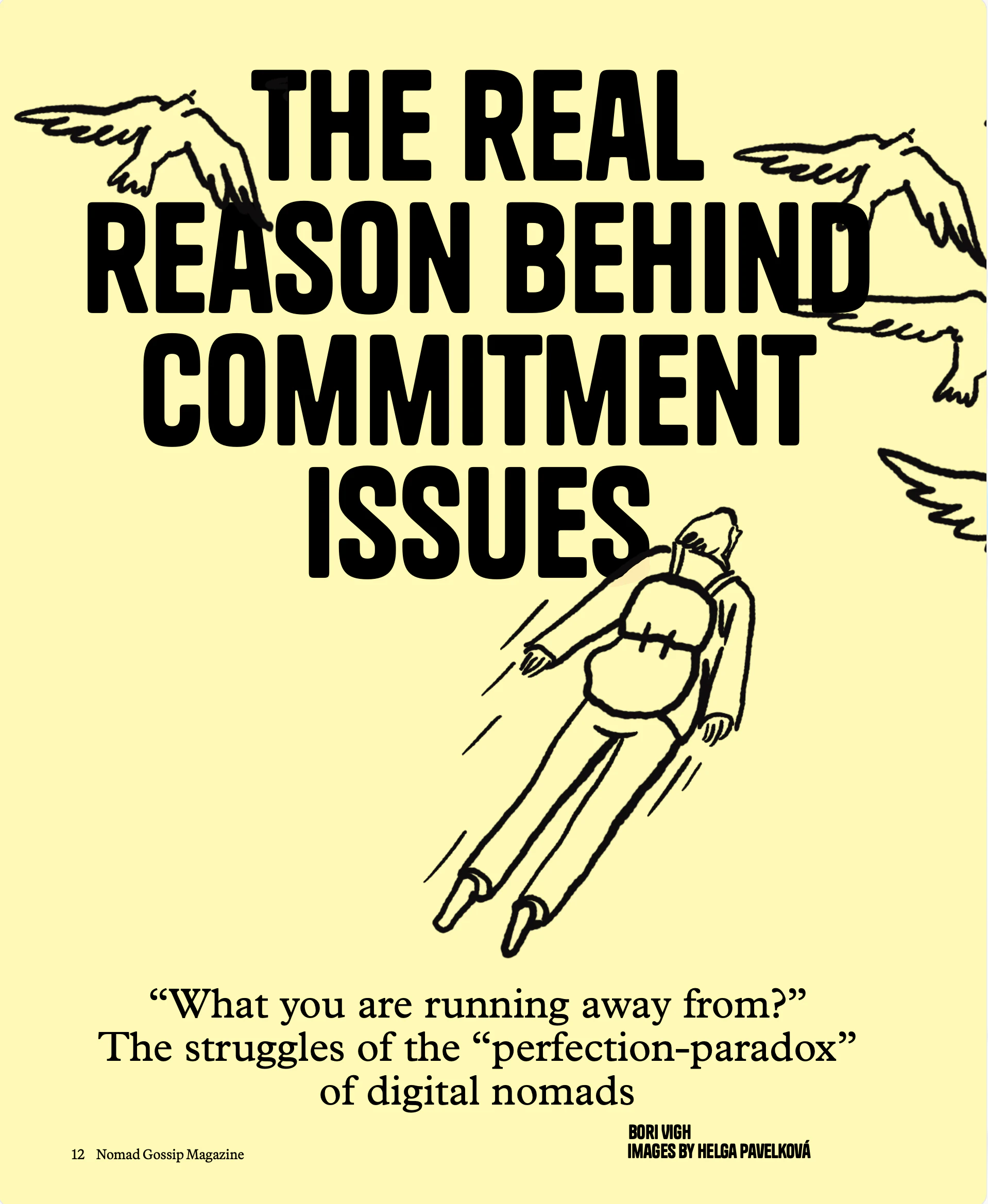
The Real Reason Behind Commitment Issues

Bori Vigh
Nomad Cruise Host & Podcast Creator
The nomadic lifestyle promises freedom, adventure, and endless possibilities. But what happens when that freedom becomes a prison of indecision? Welcome to the perfection-paradox that's plaguing digital nomads worldwide.
The Perfection-Paradox Explained
As digital nomads, we're constantly bombarded with images of perfect destinations, ideal coworking spaces, and flawless remote work setups. Social media feeds overflow with nomads living their "best life" in Bali, Lisbon, or Mexico City. This constant exposure to curated perfection creates an insidious psychological trap: the fear that any choice we make might not be the perfect choice.
"The paradox of choice is real for nomads. When you can work from anywhere, how do you choose where to be?"
This fear manifests in various aspects of nomadic life:
- Location paralysis: Spending weeks researching the "perfect" next destination, only to book last-minute flights to somewhere completely different
- Relationship hesitation: Avoiding deep connections because "what if there's someone better in the next city?"
- Project procrastination: Never fully committing to business ventures because "what if a better opportunity comes along?"
The Psychology Behind Nomad Commitment Issues
The root of nomadic commitment issues lies in what psychologists call "maximizing behavior" – the tendency to seek the absolute best option rather than settling for "good enough." While this trait can drive excellence, it becomes problematic when applied to every life decision.
For nomads, this maximizing behavior is amplified by:
FOMO (Fear of Missing Out)
The nomadic lifestyle inherently involves choices and trade-offs. Choose Lisbon, and you miss out on Mexico City. Commit to a relationship, and you might miss meeting "the one" in your next destination. This constant FOMO creates a state of perpetual dissatisfaction with current choices.
The Grass-is-Greener Syndrome
When you're not tied to any location, every other place seems more appealing than where you currently are. Bad weather in Berlin? Portugal looks amazing. Expensive rent in San Francisco? Thailand seems like paradise. This mental grass-is-greener syndrome prevents nomads from appreciating and investing in their current situation.
Identity Fragmentation
Traditional life provides identity anchors: your hometown, your office, your local community. Nomads often struggle with identity fragmentation – without these anchors, who are you really? This uncertainty makes commitment feel like losing the very freedom that defines nomadic identity.
Breaking Free from the Perfection-Paradox
Recognizing the perfection-paradox is the first step toward overcoming it. Here are practical strategies to develop healthier commitment patterns:
1. Embrace "Good Enough" Decisions
Instead of seeking perfection, aim for "good enough" decisions that meet your core criteria. Create a simple decision framework with 3-5 non-negotiable factors for locations, relationships, or projects. If an option meets these criteria, commit to it rather than continuing to search for the perfect alternative.
2. Set Artificial Constraints
Paradoxically, constraints create freedom. Set artificial limitations like "I will stay in this city for at least 3 months" or "I will give this relationship 6 months of genuine effort." These constraints force you to work within boundaries and often lead to deeper satisfaction.
3. Practice Gratitude for Current Choices
Develop a daily practice of identifying three things you appreciate about your current location, relationship, or project. This gratitude practice rewires your brain to notice the positive aspects of your current situation rather than constantly scanning for alternatives.
4. Reframe Commitment as Growth
Instead of viewing commitment as limiting your options, reframe it as an opportunity for deeper growth. Staying in one place longer allows you to build meaningful relationships, understand local culture, and develop expertise in your work. These deeper experiences often prove more valuable than surface-level exploration.
The Path Forward
The goal isn't to eliminate choice or become complacent. Instead, it's about developing a healthier relationship with commitment that allows you to fully experience and appreciate your nomadic journey. By recognizing the perfection-paradox and implementing strategies to overcome it, you can transform from a perpetually searching nomad into one who finds deep satisfaction in the choices you make.
Remember: there is no perfect destination, perfect partner, or perfect project. There are only choices that align with your values and goals at this moment in your journey. The sooner you embrace this truth, the sooner you can start building the meaningful nomadic life you actually want.
"The best decision is often not the perfect decision, but the one you fully commit to making work."

